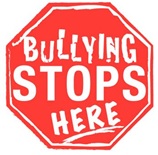October is Bullying Prevention Awareness Month. Bullying is a serious issue at home and in school, and parents and caring adults can play pivotal roles in creating healthy, safe school and community climates.
CYBERBULLYING IS BULLYING, TOO
What can I tell my child to do if he or she is being cyber-bullied?
Kids may not always recognize teasing as bullying. Some kids also may be too embarrassed or ashamed to talk to their parents about it. That’s why it’s important to talk about online and digital behavior before your child starts interacting with others online and with devices. To prepare your kid for going online or getting a cell phone, or, if you know he or she has been bullied online, offer these steps from Common Sense Media that he or she can take immediately:
- Sign off the computer. Ignore the attacks and walk away from the cyberbully.
- Don’t respond or retaliate. If you’re angry or hurt, you might say things you’ll regret later. Cyberbullies often want to get a reaction out of you, so don’t let them know their plans have worked.
- Block the bully. If you get mean messages through Instant Message (IM) or a social-networking site, take the person off your buddy or friends list. You also can delete messages from bullies without reading them.
- Save and print out bullying messages. If the harassment continues, save the evidence. This could be important proof to show parents or teachers if the bullying doesn’t stop.
- Talk to a friend. When someone makes you feel bad, sometimes it can help to talk the situation over with a friend.
- Tell a trusted adult. A trusted adult is someone you believe will listen and who has the skills, desire, and authority to help you. Telling an adult isn’t tattling — it’s standing up for yourself. And, even if the bullying occurs online, your school probably has rules against it.
PTA LEGISLATION HELPS PROTECT KIDS
 In 2011, Governor Jerry Brown signed AB 1156 (Eng). This legislation, sponsored by California State PTA, helps protect students from bullying and harassment.
In 2011, Governor Jerry Brown signed AB 1156 (Eng). This legislation, sponsored by California State PTA, helps protect students from bullying and harassment.
The bill requires training of school-site personnel in the prevention of bullying, and it gives victims of bullying priority for transferring out of a school, if requested.
Inaction can have dire consequences. Students who experience bullying are at increased risk for poor school adjustment, sleep difficulties, anxiety, depression, and negative health effects such as headaches and stomachaches. The depression and anxiety caused by being bullied can lead students to think about and attempt suicide, and have behavior problems and difficulty learning.
Bullying is prevalent on school campuses. According to the National Center for Educational Statistics, 2016, more than one out of every five (20.8%) students report being bullied.
ADDITIONAL RESOURCES
- Online Teen Safety Guide
- KidsHealth.org
- Common Sense Media Book Recommendations for Children
- Cable in The Classroom Digital Citizenship Resources
- Cyberbullying Research Center
- Bullying: Connect for Respect
- Not in Our Town/Not in Our School
- National PTA Resolution Against Bullying
- How to Tell When Your Child Is Struggling Emotionally
- Every Child in Focus
- Stomp Out Bullying
- Pacer’s National Bullying Prevention Center
- StopBullying.gov
- Substance Abuse and Mental Health Services Administration’s KnowBullying App
- Bullying Prevention: 5 Tips for Teachers, Principals, and Parents
- Centers for Disease Control and Prevention: Preventing Bullying
- California State PTA: Inclusiveness and Diversity